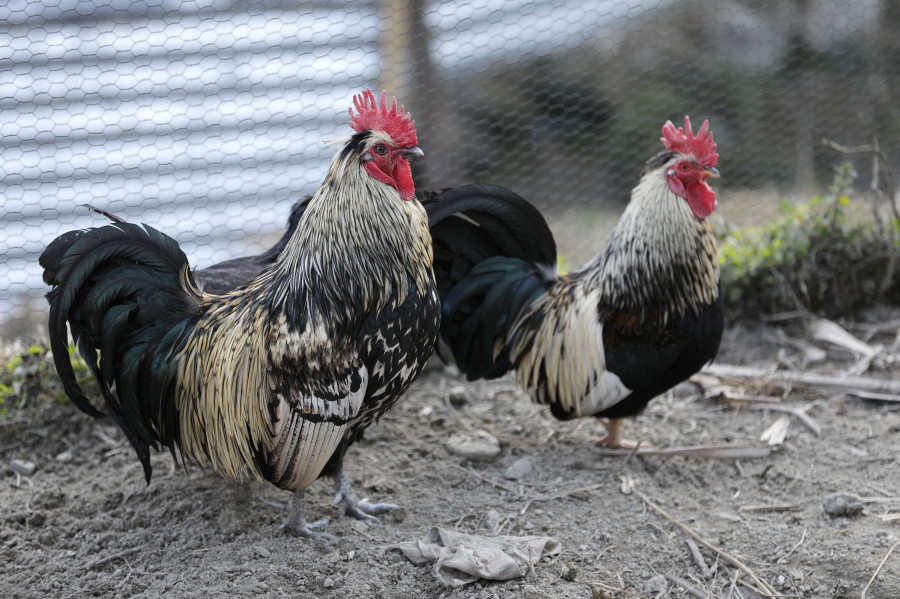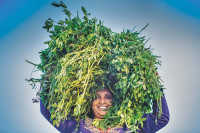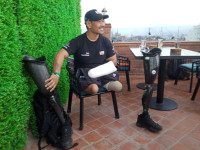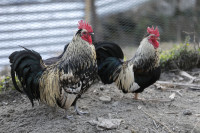Spotlight
Chicken for the meat and chicken for the soul
Himalayan Free Range, a local start-up develops “Jurelli”, a disease-resistant chicken breed that grows 40 percent faster.
Himendra Mohan Kumar
It took a passion for breeding the “perfect chicken” that brought the trio together. Setting out with a clear objective, they are now gainfully engaged in expanding their poultry farm in Gokarna, located on the outskirts of Kathmandu.
The young entrepreneurs embarked on their roller-coaster by collecting local chickens from Nepal’s 42 districts and then crossbred them on the farm.
“A new breed of chicken has been created by our firm, Himalayan Free Range Pvt Ltd. We call it, Jurelli. They are disease-resistant, have a 40 percent faster growth rate and have three times better lays than the indigenous chickens,” said Dodhia, who is the brain behind genetic engineering of chickens. He keeps himself updated on poultry farming techniques by devouring books and science papers related to genetics.
Typically, a Jurelli has little tufts of feathers behind the comb. It’s able to withstand harsh climates and diseases, can survive on poor feed, is able to hatch its own chicks and is able to produce more eggs than the locals. It is also able to compete with the hybrids in terms of productivity.
A Jurelli would lay, on average, 180 eggs a year and the breed doesn’t require any special treatment or feed.
But, the organic chicken venture almost never happened.
Dodhia, an economics graduate from Edinburgh University, found his true calling in Nepal and set up life here in 2016. He had been visiting the country with his father, an avid trekker, off and on and got charmed by its languid pace of life and the warmth of its people.
Dodhia found enormous potential in organic farming in Nepal and started a business by leasing 20 ropanis of land on the capital’s outskirts with an aim to grow black organic rice, tomato and basil.
A year later, that business failed and Dodhia had lost all his capital, which amounted to as much as $52,000. Dejected, he decided to fold up the enterprise and return to the UK.
Meanwhile, Dhakal, a Nepali girl from Mulpani had grown up loving chickens, but cultural restrictions ensured she was never allowed to keep any.
Given her family’s tough financial circumstances, she was forced to take up a cashier’s job in Dubai after abandoning her studies. Two years later, in February 2017, Dhakal returned home, firm in her mind to do something on her own.
She was passionate about agriculture; she wanted to begin farming, but had little means to do so.
By sheer providence, she met Dodhia.
Dodhia happened to frequent Dhakal’s mother's departmental store, and being comfortable in English, they began talking to each other. Dodhia, at the time, was still running his organic farm in Gokarna.
Then, the duo struck a deal.
Without any transportation, Dodhia needed a means back and forth to his farm, and Dhakal needed space to raise her chickens. So they agreed that she would take him back and forth on her scooter and in return, he would help her build a chicken barn and she could use some of the land for her farming.
Riding the scooter’s pillion back and forth and spending time with Dhakal on the farm, their love for each other, blossomed. Dodhia and Dhakal got married in June 2018.
“In March 2017, we had informally started our venture with three chickens. By the end of 2017, we had 413 chickens,” Dhakal recalled.
With Dodhia’s scientific advice, they began to breed an indigenous disease-resistant chicken that would lay well. However, too many chickens, led to too many chicks, and while they were fulfilling their dream to breed the perfect chicken, the research and development expenses led to loss after loss.
Eventually, the business looked unsustainable, and they thought of liquidating the company and relocate to the UK. While being involved in the liquidation process, they met an angel investor in their lawyer, Pandit.
Pandit had helped turn his father’s law firm of four to the largest law firm in Nepal. He convinced the couple to give him three months of their time, that he would invest Rs1.5 million in their venture and turn it around. And, he did. Pandit’s business savvy, energy and leadership indeed, turned the company around.
They started off by selling one day-old chicks to farmers for Rs250. With a customer base that now spans from Dhangadi in the east to Jhapa in the west, the company supplies chicks through a chain of farmers it has been able to create.
“Our aim now is to sell 1,000 chicks a week, and next year, scale up the weekly supplies to 2,500. We have also purchased our own incubator and next year, we are expecting our business to break even,” Pandit said.
Come April, their poultry farm will also begin selling 600 chicken eggs a week, locally, at Rs25 apiece.
“Last year, the company made Rs1.8 million and we invested all of it back in business. This year, we are expecting to make Rs4 million and we will put all the money back into the business, again,” Pandit added.
He said although the Himalayan Free Range is a profit-oriented business, it has two long-term goals.
The first is to commercialise the Jurelli and make it a sustainable business that can continue innovating on the gene pool they have honed and secondly, they want their farmers, particularly, the women-led households to have a small flock of Jurellis that can survive the harshest conditions, forage on the natural resources at their disposal and provide eggs that they can feed their families and themselves.
Pandit wants their company to embrace the United Nations’ Sustainable Development Goals with the aim to reduce or even eradicate malnutrition and childhood stunting in Nepal.
“It’s well known that an egg a day could go a long way in achieving the nutritional goal. This is where the Jurellis come in,” said Pandit.




 16.16°C Kathmandu
16.16°C Kathmandu








